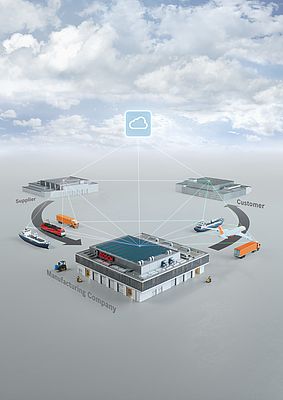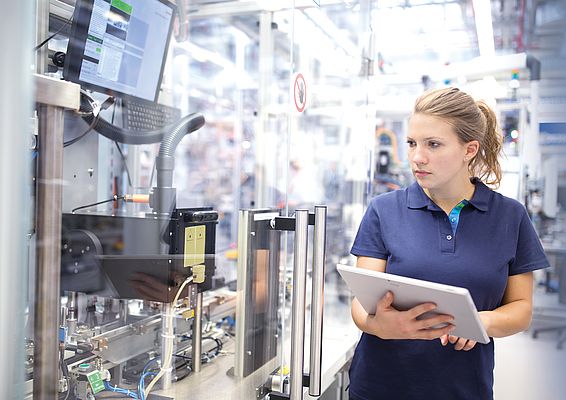Industry 4.0 has made it possible to connect the whole factory, from the shop floor to warehouses. The German company Bosch is a pioneer in the area of Industry 4.0, which was first implemented to improve the company’s plants. Currently, Bosch’s IoT solutions are running in more than a hundred of its factories around the world. Two years ago, the company decided to found Bosch Connected Industry, an independent company of the Bosch Group focusing on software solutions for the digitization of the entire value chain of the manufacturing industry.
A step-by-step transition towards Industry 4.0
Bosch Connected Industry is for 95% a software company and gathers all its Industry 4.0 solutions and the different use cases in a comprehensive portfolio called Nexeed Industrial Application System. The software system covers all processes within the factory, from manufacturing to logistics, and has been enhanced with interoperability features to connect all the different parts of the value chain, from intralogistics and extralogistics to shop floors. ‘’Nexeed works like a modern car, where you can visualize the status of the single parts. Nexeed works the same way for the factory. It gives an overview of all machines and operating systems, and when the behavior of one part changes slightly, you get a notification on your smartphone, so you easily plan maintenance in advance,’’ explained Sven Hamann, Senior Vice President at Bosch Connected Industry.
The idea behind Nexeed is that a company, no matter its size, can approach Industry 4.0 step by step, without having to make huge investments at once in the complete renovation of the plant. ''The idea is to offer proven solutions that are all available in the same portfolio and ready to use. Small and medium-sized companies need to find solutions with short payback times, as they can’t afford to invest in a whole new platform and wait four or five years to see the return on investment,’’ said Mr. Hamann.
What is interesting about Nexeed is that the numerous solutions available are not standalone, but they are still part of the same portfolio. Companies can therefore move towards Nexeed industrial systems gradually, instead of being forced to a radical redefinition of the whole factory, for which they are often not ready, both financially and logistically. This gives the flexibility needed for a soft digital transition with a feasible and realistic plan, based on a bottom-up approach.
Flexibility is the keyword
To illustrate better how flexible Nexeed can be, Sven Hamann explained that the system consists of three elements. The first one is Nexeed Software Portfolio, which includes small and easy-to-use solutions that can solve specific customer’s problems guaranteeing a quick payback. ''At Bosch, we have a very strong vision for the factory of the future. Even small solutions are slowly moving towards a new concept of manufacturing,’’ Mr. Hamann declared.
The second element comes from Bosch’s long experience in the digital factory. ''We offer consulting on how to organize the factory. The background is that, if you want to digitize your factory, you must be sure that you have efficient processes,’’ Mr. Hamann continued. Efficiency is therefore of key importance, at least as much as the third element: people. Before going digital, it’s essential to focus on people to prepare them adequately for the change. ‘’At Bosch, we also provide training to help improve programming and software skills, which are necessary for the transformation process. We can affirm that we really support the complete value chain in the factory while offering software for process visualization.’’
An open approach
Bosch Connected Industry offers a more flexible, pragmatic and open approach to Industry 4.0. The open nature of Nexeed is another important element that differentiates it on the market. Nexeed has an open interface that doesn’t lock users in a Bosch environment. Customers have the ability to integrate hardware from other partners, or even from their own solutions, building a new structure on top of existing machines. This is the real benefit of this platform. ‘’To make Industry 4.0 happen, we think that it’s important to develop open standards that facilitate the integration of different solutions into the same system. We are currently working with associations, partners, and user consortia to go in this direction,’’ Sven Hamann clarified.
Bosch Connected Industry is highly involved in the German Plattform Industrie 4.0 project – promoted by the German Federal Ministry of Economic Affairs and Energy and by the Federal Ministry of Education and Research – that aims to create a network to shape the digital transformation of the manufacturing industry. Among the numerous partnerships sealed, Bosch Connected Industry is working closely with Sick, to bring together its expertise in sensor technology with Bosch’s software experience. ‘’We can’t succeed in today’s market if we work alone. Industry 4.0 is a game-changer and we really need to go for it to reduce the costs of our production and compete on a global level. This is our challenge, not only as a company but as a European industrial community.’’
Sara Ibrahim



















